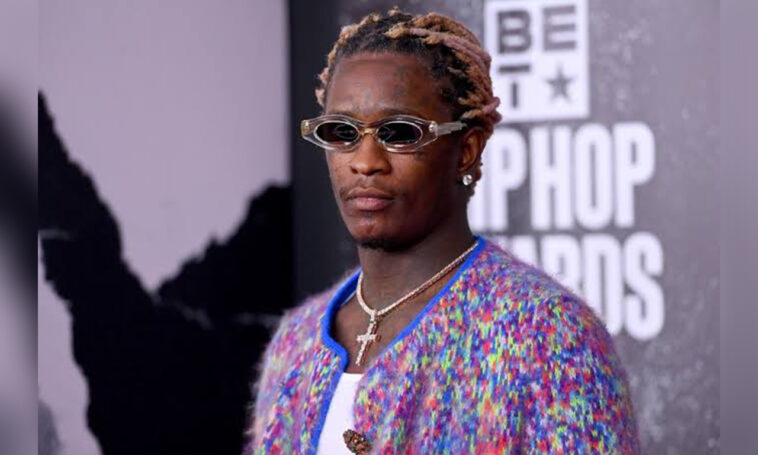Rapper Young Thug, whose real name is Jeffery Williams, has been released from custody after being sentenced to time served in a lengthy trial. Williams spent over 900 days in jail related to charges involving gang activity and firearm possession. As part of a non-negotiated plea agreement, he will serve 15 years on probation. During his court appearance, Young Thug accepted responsibility for his actions and expressed a desire to change. This case has garnered significant media attention, particularly regarding the controversial use of rap lyrics in court as evidence.
Young Thug has officially been released from custody after a long and complex trial that captivated the public’s attention. The rapper, whose real name is Jeffery Williams, was sentenced to time served following more than 900 days in jail. His release comes as part of a non-negotiated plea agreement that requires him to serve 15 years on probation.
The trial has sparked significant debate, particularly regarding the use of rap lyrics as evidence in court. Many critics argue that this practice is a form of racial discrimination against artists and a violation of freedom of speech.
Young Thug himself acknowledged the potential misinterpretation of rap lyrics, stating, “I promise you, I’m 100% changing that.”
Williams entered a guilty plea to several charges, including firearm possession and participation in criminal street gang activity. He also pleaded no contest to racketeering and leading a criminal street gang. These charges stemmed from a sweeping case involving over two dozen defendants, making it one of the longest trials in Georgia’s history.
In 2022, Young Thug was charged alongside numerous other individuals under Georgia’s Racketeer Influenced and Corrupt Organizations Act, commonly known as RICO. Prosecutors accused him of leading a gang that was involved in serious crimes, including murder, dating back over a decade. Young Thug, however, has consistently denied being the head of any criminal enterprise.
During the trial, prosecutors argued that YSL, the acronym for Young Stoner Life Records, also represented a criminal gang known as Young Slime Life, which is linked to the Bloods gang. The prosecution aimed to show that Williams was deeply involved in gang activities, including a 2015 shooting that resulted in a fatality.
Despite the serious nature of the charges, several co-defendants, including rapper Gunna, accepted plea deals or had their cases separated from the main trial. Young Thug remained one of the final defendants still facing trial. He had been in custody since his arrest in May 2022.
On Thursday, Williams pleaded guilty to six charges, which included participation in criminal street gang activity and violating the Georgia Controlled Substances Act. His no-contest pleas mean he accepted the consequences without contesting the charges, allowing the court to treat them as guilty pleas.
When given the chance to speak in court, Young Thug took responsibility for his actions. “I am a smart guy. I am a good guy. I really got a good heart,” he told Fulton County Superior Court Judge Paige Reese Whitaker. He expressed regret for his past mistakes and shared his commitment to changing his ways. Williams also mentioned his charitable efforts, including free concerts for communities in need.
Judge Whitaker, before delivering the sentence, advised Williams to “try to be more of the solution and less of the problem.” She outlined the conditions of his probation, which includes remaining away from the Atlanta metropolitan area for the first ten years, except for specific events like weddings and graduations. Additionally, Williams must return to Atlanta four times a year to conduct anti-gang and anti-gun presentations and complete 100 hours of community service each year.
As the case drew to a close, several other co-defendants accepted plea agreements. For instance, Rodalius Ryan, known as “Lil Rod,” received a 10-year sentence commuted to time served, while Marquavious Huey received a 25-year sentence with a mix of custody and probation. These developments suggest a significant shift in the prosecution’s strategy as the trial neared its conclusion.
Young Thug’s release marks a pivotal moment in a case that has not only impacted his life but has also sparked discussions about the treatment of artists within the justice system. As he embarks on this new chapter, the rapper faces the challenge of rebuilding his life while adhering to the terms of his probation.
Young Thug’s release after being sentenced to time served reflects a complex legal journey. With a commitment to change and a focus on community impact, he hopes to turn a new leaf. The implications of this case will likely resonate within the hip-hop community and beyond, raising important questions about the intersection of art, law, and personal responsibility.





Join the Community and Be a Part of the Conversation
You must be logged in or registered to post a comment.